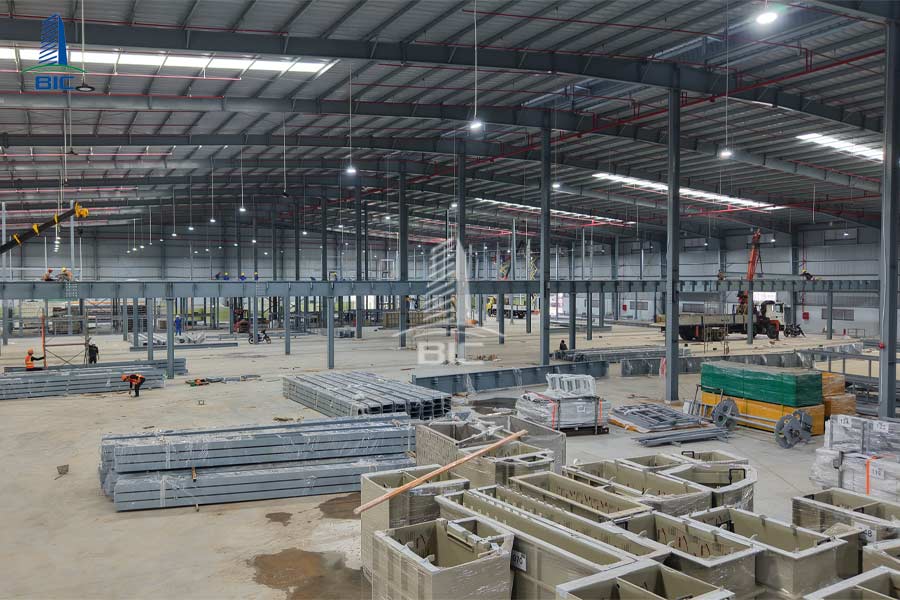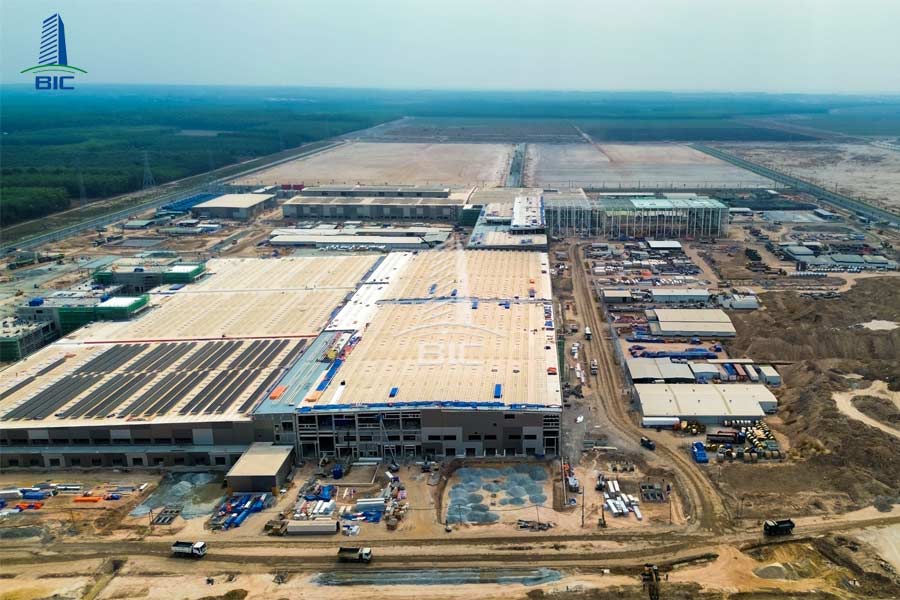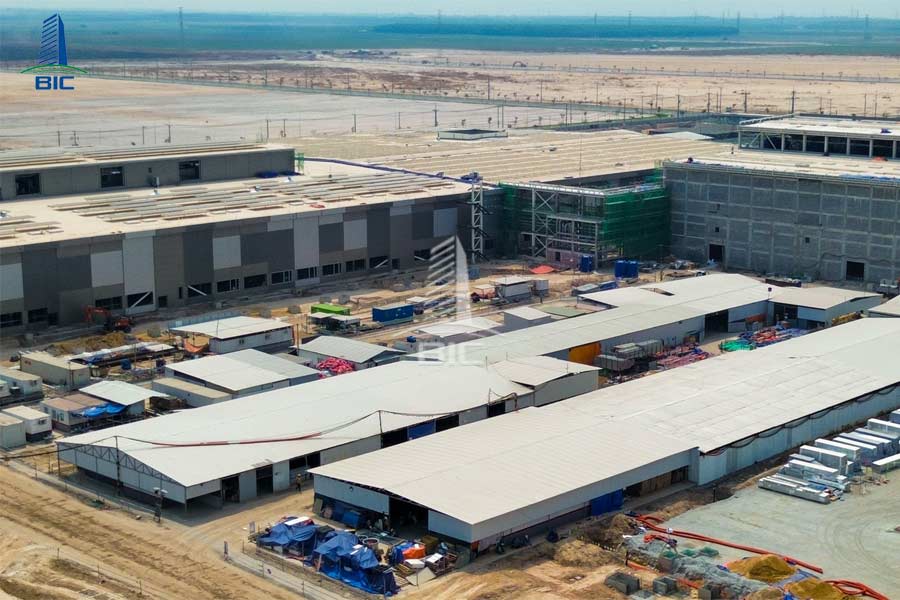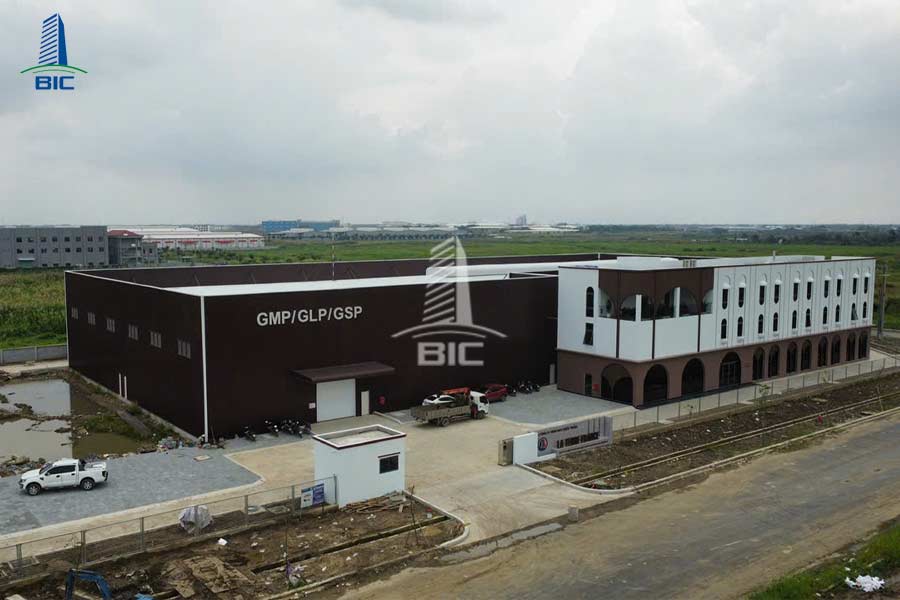
Vietnam has become a top destination for international investors in the industrial manufacturing sector. With its strategic location at the heart of Southeast Asia, competitive labor costs, attractive investment incentives, and a stable political environment, many foreign enterprises have chosen Vietnam as the site for their production facilities particularly in major industrial parks such as VSIP, Long Hau, Amata, Phuoc Dong, and Deep C.
Establishing a factory in an industrial park offers numerous advantages to foreign direct investment (FDI) enterprises, including complete technical infrastructure, centralized administrative procedures, convenient logistics connections, and available support services. However, to successfully launch a project, investors must clearly understand the legal process from obtaining the Investment Registration Certificate (IRC) and Enterprise Registration Certificate (ERC) to the design, construction, and commissioning of the factory.
With extensive experience accompanying global corporations in the design and construction of industrial facilities, BIC provides comprehensive solutions that help foreign investors navigate Vietnam’s legal framework, optimize project schedules, and control investment costs. This article outlines in detail the procedures for establishing a factory in an industrial park for foreign enterprises, helping investors understand each stage, required documentation, and key considerations for a smooth and effective investment process.
Over the past decade, Vietnam has emerged as a strategic hub for international investors in industrial manufacturing. FDI inflows have grown steadily, particularly in key industrial zones such as Bac Ninh, Hai Phong, Binh Duong, Dong Nai, and Long An. According to the Ministry of Planning and Investment, by 2025, the total registered FDI in Vietnam is expected to exceed USD 50 billion, with over 70% concentrated in manufacturing and processing projects.
Vietnam attracts foreign investors due to its advantageous geographic position situated between major Asian economic centers such as China, Japan, and Singapore along with its competitive labor costs and appealing investment incentives. Government support for FDI enterprises, such as corporate income tax exemptions, import duty waivers, and streamlined administrative procedures, has facilitated international companies’ expansion into Vietnam.
Industrial parks play a crucial role in this process. With synchronized infrastructure including electricity, water supply, telecommunications, internal roads, wastewater treatment, and fire protection systems, industrial parks help enterprises significantly reduce project preparation time and initial capital costs. Furthermore, centralized management through Industrial Park Authorities simplifies investment, design, and construction approval processes—ensuring transparency, efficiency, and compliance.
For foreign investors, establishing a factory in an industrial park is not only a convenient choice but also a long-term strategic advantage. It shortens implementation time, minimizes legal risks, facilitates logistics connectivity, and provides comprehensive operational support. Consequently, Vietnamese industrial parks are increasingly becoming key production hubs in the global supply chain, reinforcing Vietnam’s position on the regional industrial map.

To obtain approval for investment and factory construction design in Vietnam, foreign enterprises must meet all legal, financial, and technical requirements as stipulated in the Law on Investment (2020) and the Law on Enterprises (2020). This is the most critical preliminary step before proceeding with land leasing, factory design, and operational setup.
Vietnamese law allows foreign investors to choose from several forms of investment depending on project objectives and scale:
- 100% Foreign-Owned Enterprise: The investor holds full ownership and control—suitable for manufacturing, processing, high-tech, or export-oriented sectors.
- Joint Venture with a Vietnamese Partner: Combines capital, technology, and management expertise ideal for sectors requiring local market knowledge or domestic raw materials.
- Capital Contribution or Share Acquisition: Applicable to investors seeking to participate in an existing Vietnamese enterprise to expand production or establish a new factory.
Foreign enterprises may invest in most industrial manufacturing sectors, except for restricted areas such as national defense, security, natural resource exploitation, or sectors affecting public health.
The list of prohibited and conditional sectors is detailed in Appendix IV of the Law on Investment 2020. For conditional industries (e.g., food, pharmaceuticals, chemicals, or environmental sectors), investors must obtain additional specialized licenses before being granted the IRC.
Investors must demonstrate adequate financial capability to execute the project. Required documents include:
- The parent company’s financial statements for the past two years.
- Bank account balance confirmation equivalent to the registered investment capital.
- Business registration certificate of the parent company (consularly legalized).
- Passport or legal authorization of the company’s legal representative.
Foreign enterprises are permitted to lease land or factories only within industrial parks, export processing zones, or economic zones with approved master plans.
- Typical lease terms are up to 50 years, extendable depending on project size.
- Investors may sign land lease agreements directly with the industrial park developer or lease ready-built factories.
- The leased site must comply with land-use, transport, environmental, and fire safety regulations.
Before construction, foreign enterprises must prepare an Environmental Impact Assessment (EIA) or an Environmental Protection Plan, depending on project scale.
Additionally, all factory designs must comply with:
- QCVN 06:2022/BXD – Fire Safety Standards,
- QCVN 07:2016/BXD – Urban Technical Infrastructure,
- TCVN 2737:1995 – Loads and Actions on Structures, as well as other applicable standards on labor safety, electricity, ventilation, and wastewater treatment.
Complying with these legal and environmental conditions from the outset ensures a smoother licensing process and helps investors avoid costly delays.

For foreign enterprises planning to build factories in Vietnam, adherence to the legal and technical process is essential for rapid project approval and lawful operation. The full process typically consists of five main stages:
Documents required:
- Investment project proposal (objectives, scale, capital, timeline).
- Consularly legalized business license of the parent company.
- Latest financial statements or equivalent financial proof.
- Passport/authorization of legal representative.
- Proposed location for land or factory lease in the industrial park.
Authority: Industrial Park Management Board (IPMB) or Department of Planning and Investment (DPI).
Processing time: 10–15 working days.
Outcome: Investment Registration Certificate (IRC).
After receiving the IRC, investors must register a local legal entity.
Documents required:
- Application for enterprise registration.
- Company charter.
- List of members or shareholders.
- Capital verification documents.
- Consularly legalized investor documents.
Authority: DPI of the province/city.
Processing time: 3–5 working days.
Outcome: Enterprise Registration Certificate (ERC).
Required documents:
- Technical design drawings by a licensed consultancy.
- Land lease certificate or contract.
- IRC and ERC.
- Fire protection and EIA approvals.
Authority: IPMB in coordination with the Department of Construction.
Processing time: 15–20 working days.
Note: Design must comply with QCVN 06:2022/BXD, QCVN 07:2016/BXD, and TCVN 2737:1995.
After construction completion:
- Apply for environmental approval or EIA completion certificate.
- Safety inspections (electricity, boiler, pressure vessels, elevators).
- Obtain Fire Safety Certification.
- Register tax code, bank account, company seal, and labor contracts.
Steps:
- Project acceptance and technical infrastructure inspection.
- Submission of application to IPMB for operation approval.
- Customs and import/export registration (if applicable).
Processing time: 3–6 months in total, depending on project type and scale.
Working with an experienced industrial design and construction consultancy such as BIC helps streamline approvals, ensure legal compliance, and guarantee international-quality standards for design, safety, and environment.

To ensure smooth approval, investors must prepare comprehensive legal, financial, and technical documentation, including:
- Legal documents of the foreign investor.
- Application for the Investment Registration Certificate (IRC).
- Application for the Enterprise Registration Certificate (ERC).
- Construction permit documentation and design drawings.
- Completion and acceptance documentation.
All foreign documents must be consularly legalized and officially translated into Vietnamese. Consistency across all documents company name, capital, and project site is essential to avoid delays.
|
Procedure |
Estimated Time |
Competent Authority |
|
Investment Registration Certificate (IRC) |
10–15 days |
IPMB or DPI |
|
Enterprise Registration Certificate (ERC) |
3–5 days |
DPI |
|
Design appraisal & Construction permit |
15–20 days |
IPMB & DoC |
|
Fire safety & Environmental assessment |
20–30 days |
Fire Police, DoNRE |
|
Final inspection & Operation license |
10–15 days |
IPMB & specialized agencies |
Total timeframe: Approximately 3–6 months, longer for projects in special sectors (e.g., food, pharmaceuticals, chemicals).

Vietnam provides numerous fiscal and administrative incentives for foreign manufacturers:
Corporate Income Tax (CIT) & Import Tax Exemptions
- 100% CIT exemption for 2–4 years, 50% reduction for the following 4–9 years.
- Up to 15 years of incentives for high-tech or priority sectors.
- Import tax exemption for machinery and raw materials not available domestically.
Land Lease Incentives
- Land rent exemption for 3–7 years.
- Long-term lease (50–70 years).
- Flexible payment schedules and sublease transfer options.
“One-Stop” Administrative Support
- All procedures handled at the IPMB office.
- Simplified coordination between departments (Investment, Construction, Environment, Fire Safety).
- Assistance in legal guidance, logistics, labor recruitment, and banking.
Labor and Logistics Support
Many industrial parks integrate housing, training, and logistics facilities to ensure labor stability and supply chain efficiency.
By complying with Vietnam’s legal framework and working with an experienced industrial consultancy like BIC, foreign investors can significantly shorten licensing time, minimize risks, and ensure that their factories are designed, constructed, and operated to international standards creating a strong foundation for sustainable production in Vietnam.